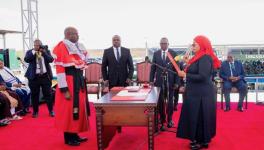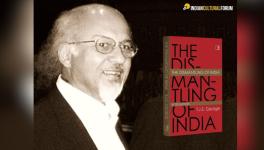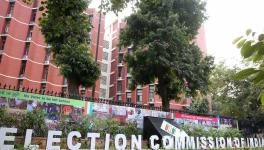Why a Canadian City Remembers Gauri Lankesh and India Does Not

For many years, well-known human rights activist Teesta Setalvad and activist-journalist Gauri Lankesh were “comrades-in-arms”. Both were born in 1962; both fought communalism and obscurantism. They shared the same values, faced similar challenges, and rejoiced after battles won. Then, on 5 September 2017, armed motorcycle-borne men shot Gauri in the head, killing her instantly. To Setalvad, memories of their struggles and friendship are still an open wound. “I think of Gauri every minute,” she says, “but the week before and week after the day she was killed, I feel the worst.”
This year’s anniversary of Gauri’s killing is as painful a reminder of the friend she lost. Memories of Gauri and her brutal killing on the threshold of her Bangalore home still haunt Setalvad. Yet, news from a city in faraway Canada also holds an incandescent spark of hope for all those who believe in rationality, anti-extremism and scientific temper.
Burnaby, the third-largest city in British Columbia, has declared 5 September as ‘Gauri Lankesh Day’ in support of freedom of speech, the right to dissent, and in solidarity with the values she stood for.
To Gauri’s sister Kavitha, news of the commemoration came as a pleasant surprise. “Every year, we organise public events to remember her in the days before and after 5 September,” she says. “But when the owners of halls or venues we try to book to organise such events know who we are remembering, they turn us away. Burnaby’s gesture has touched me and it is also deeply ironical that nobody in India is willing to express such concern,” she says. This year, like in 2020, only virtual events have been organised due to the pandemic.
Gauri’s killing shook the world, and the Indian-origin residents of Burnaby were not oblivious to its horror. Besides, it preceded and was followed by several similar attacks that got noticed the world over. It is indeed an irony that in the world’s biggest democracy, with over 1.3 billion people, not one municipality, not even her city of Bangalore, ever cared to remember Gauri although her life was cruelly cut short.
Instead, a tiny population of 25,000 South Asians (mostly of Indian origin) in Burnaby will never forget 5 September, thanks to Gauri Lankesh Day.
“Ordinary people everywhere condemned Gauri’s assassination and questioned the ethics of people who engage in violence. They felt freedom of the press exists because of people like her, who had to pay with their lives for their beliefs,” Kavitha says, adding, “That is why, I think, Burnaby made this proclamation.”
Cynics would say that silence and fear are the only natural responses to the impunity with which supremacists of the same sort who killed Gauri roam around in India. But Gurpreet Singh, an Indian-Canadian journalist who runs a platform called Radical Desi, says, “We did not want a Gauri Lankesh Day because we hope to change the mindset of those who took her life. We wish to change things at the grassroots level.” In other words, he understands that it is not easy to get those in power to let go of their privilege willingly. “That is why, only ordinary people can stand up against oppression and for the real India which people like Gauri represent,” he says. That is why Gurpreet approached the city authorities of Burnaby to proclaim a day in her memory.
In 2007, Burnaby had proclaimed 27 September as a day of remembrance for the Indian revolutionary Shaheed Bhagat Singh on his 100th birth anniversary. In 2019, it proclaimed 13 April as “commemoration day” to mark the 100th anniversary of the Jallianwala Bagh massacre, which became a turning point in India’s struggle against the yoke of colonialism.
Interestingly, Burnaby authorities do not promote the dates or personalities that mark any day as unique. The proclamations are symbolic and represent a moral conviction. Yet, it is left to citizens who support the causes, historical events or people and organise events around them. So, on 5 September, Gurpreet and like-minded people, mostly of South Asian origin, have planned a vigil for Gauri. They expect Sav Dhaliwal, the Burnaby City Councillor, will attend.
Dhaliwal, a Canadian citizen of Indian origin, backed Gurpreet’s proposal and Burnaby Mayor Mark Hurley approved it. It is he alone who can issue proclamations. Burnaby is in Vancouver, British Columbia. Voters directly elect its City Councillor and Mayor. It is another contrast with India, where elected representatives rarely speak out for those who struggle against superstition, communalism, or citizens’ constitutional rights.
Dhaliwal says he had never heard of Gauri or her murder until Gurpreet told him. When he learned about her role in “keeping democracy alive”, he was won over. “We appreciate journalists like Gauri Lankesh who speak for or against issues that matter. Journalists give civil society—people like myself—information on issues we cannot access and weigh independently. That she was killed was enough for our mayor to proclaim a day for her. We feel it is our duty to support human rights and the right of people to know all the facts, which is the job of journalists to provide,” says Dhaliwal over the phone from Canada.
There is a lesson for Indian leaders and citizens from Burnaby’s proclamation. Not all residents of the city think alike. Nor do all espouse the exact cause or share value systems. Each resident does not care equally about important issues. It is a diverse city with numerous ethnicities and languages. It follows that residents have differences and disputes too. “But as elected representatives, we stand with a principle or a policy. If something is very divisive, we do not stand stand for it,” says Dhaliwal. He clarifies that Burnaby proclamations do not distinguish who is in power. Nor are proclamations a means to condemn any government. “We speak for human rights, freedom of speech, fairness and democracy. On international issues, we often do not have enough information to take sides. If we mark somebody’s contribution, it is for something good they have done, not their politics,” he says.
It is tragic that those curious about and interested in democracy, the work of activists, journalists, and dissenters, would not find any authoritative information on these issues from Indian authorities, even at the provincial or local level. “We all know Gauri is not the only one who fought for human rights and was silenced—Dhabolkar, Kalburgi, Pansare, all deserve to be remembered,” Setalvad says.
Notably, Setalvad reminds us that there have “always been enough people in India who believe in the Constitution, pluralism and secularism. Only their voice gets drowned by shrill supremacists”. Further, the Hindus, Sikhs, Christians and Muslims of Indian origin in Burnaby, by remembering Gauri, by standing up for slain rationalists and democrats, are proving that Indians do espouse democracy—the problem is that “in the India we live in, the fringe has become the mainstream”.
For Kavitha, “Gauri Lankesh Day” is a reminder that all over the world, there are people who remember her sister as one who cared for democracy and freedoms. It is a sign that they are not alone and that the world is watching. “Not just Gauri, people who care for democracy remember social movements and protests, such as the anti-CAA protests in India, too,” she says.
Gauri’s friends and associates will spend another week remembering Gauri through events personal and public. Even if the Indian state turns a blind eye to what is going on, they know that activists, journalists, dissenters—and yes, even farmers—will simultaneously recollect their kind who are jailed, beaten, silenced, deep-traced via Pegasus or slain.
Get the latest reports & analysis with people's perspective on Protests, movements & deep analytical videos, discussions of the current affairs in your Telegram app. Subscribe to NewsClick's Telegram channel & get Real-Time updates on stories, as they get published on our website.
























